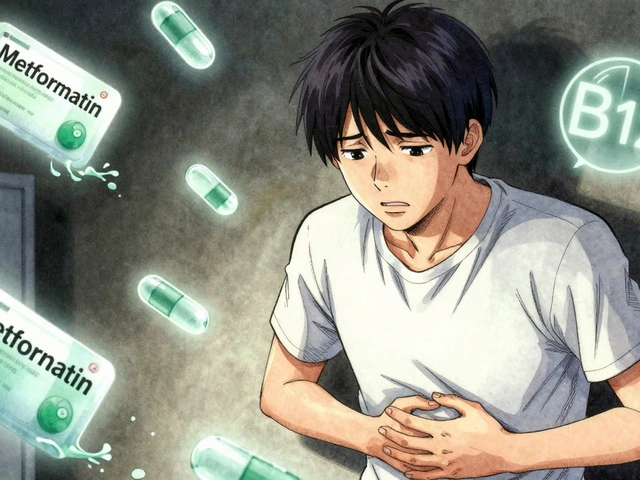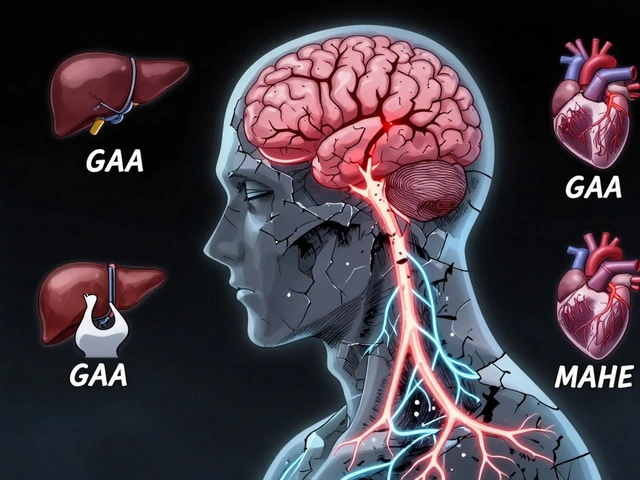Depression isn’t just about feeling sad. For many people, the heaviest part isn’t the sadness at all-it’s the exhaustion. Waking up tired. Struggling to get through the day. Even small tasks feel impossible. This isn’t laziness. It’s depression-related fatigue, and it’s one of the most persistent and overlooked symptoms of major depressive disorder. Traditional antidepressants often help with mood but leave fatigue untouched. That’s where vortioxetine comes in.
What Makes Depression Fatigue Different?
Everyone gets tired. But depression-related fatigue is different. It doesn’t go away with sleep. It doesn’t improve with caffeine. It’s not tied to physical exertion. People describe it as a heavy blanket, a mental fog, or a battery that never charges. Studies show that up to 80% of people with depression report severe fatigue, and it’s often the symptom that makes them stop treatment altogether.
Unlike fatigue from lack of sleep or overwork, this kind of tiredness is tied to brain chemistry. It’s linked to low activity in areas responsible for motivation, attention, and reward. That’s why rest doesn’t fix it. You need a treatment that targets the underlying neural pathways-not just serotonin.
How Vortioxetine Works Differently
Vortioxetine, sold under the brand name Trintellix, is not your typical SSRI. Most antidepressants, like fluoxetine or sertraline, only block the reuptake of serotonin. Vortioxetine does that too-but it goes further. It also acts on five different serotonin receptors in the brain. This multi-target approach helps restore balance in networks that control mood, focus, and energy.
Research from the Journal of Clinical Psychiatry in 2023 showed that vortioxetine significantly improved scores on the Fatigue Severity Scale compared to placebo and even outperformed some SSRIs in patients with persistent fatigue. The effect wasn’t just about feeling less sad-it was about feeling more capable. People reported better concentration, quicker decision-making, and more motivation to get out of bed.
One key mechanism is vortioxetine’s action on the 5-HT3, 5-HT7, and 5-HT1D receptors. These are involved in cognitive function and arousal. By modulating them, vortioxetine doesn’t just lift mood-it wakes up the brain’s ability to engage with the world.
Real-World Results: What Patients Actually Experience
In a 2024 observational study of 1,200 patients with major depression and fatigue, those on vortioxetine reported noticeable energy improvements within two to three weeks. That’s faster than most SSRIs, which often take six weeks or more to show any effect on fatigue.
One patient, a 42-year-old teacher from Ohio, described it this way: “I was exhausted all the time. I couldn’t grade papers. I canceled plans. After switching to vortioxetine, I didn’t feel ‘happy’ right away-but I felt like I could breathe again. I started walking my dog again. I made coffee in the morning without staring at the clock.”
These aren’t isolated stories. Clinical trials consistently show that vortioxetine improves performance on cognitive tasks like attention span, memory recall, and processing speed-functions that are directly tied to energy levels. When your brain stops working overtime just to stay awake, you have more mental bandwidth left for daily life.

How It Compares to Other Antidepressants
Here’s how vortioxetine stacks up against common antidepressants when it comes to fatigue:
| Medication | Effect on Fatigue | Time to Notice Improvement | Cognitive Side Effects |
|---|---|---|---|
| Vortioxetine | Significant improvement | 2-4 weeks | Minimal; may improve focus |
| SSRIs (e.g., sertraline) | Mild to moderate | 6-8 weeks | Can cause drowsiness or mental slowing |
| SNRIs (e.g., venlafaxine) | Moderate improvement | 4-6 weeks | May increase anxiety or insomnia early on |
| Bupropion | Good for energy | 3-5 weeks | Can cause jitteriness or agitation |
Vortioxetine stands out because it doesn’t trade one problem for another. Bupropion might boost energy, but it can make anxiety worse. SNRIs help with motivation but often cause insomnia. SSRIs are gentle but slow-and fatigue often lingers. Vortioxetine offers a balanced approach: better energy without the side effects that derail other treatments.
Who Benefits Most?
Vortioxetine isn’t a magic pill for everyone. But it’s especially helpful for people who:
- Feel mentally drained, not just emotionally low
- Struggle with concentration or memory at work or school
- Have tried other antidepressants but still feel stuck in a fog
- Want to avoid sedating medications
It’s also a strong option for older adults, where fatigue is often mistaken for aging. Studies show vortioxetine is well-tolerated in patients over 65, with lower risk of dizziness or falls compared to some older antidepressants.
Potential Downsides and What to Watch For
No medication is perfect. Vortioxetine can cause nausea, especially in the first week. About 1 in 5 people report mild stomach upset, but it usually fades. Dizziness and dry mouth are less common. Unlike some antidepressants, it doesn’t typically cause weight gain or sexual side effects-two major reasons people quit treatment.
The biggest risk? Not giving it enough time. Many patients stop after two weeks because they don’t feel “cured.” But fatigue improvement often comes before mood lifts. Stick with it. Talk to your doctor if nausea is severe or if you feel worse after starting.

What to Expect When Starting
Most doctors start with 5 mg daily, then increase to 10 mg or 20 mg based on response. Take it at the same time each day-morning is best, since it can be mildly activating. Don’t drink alcohol. Don’t stop suddenly. Even if you feel better, keep taking it as prescribed.
Track your energy. Use a simple scale: 1 = completely drained, 10 = fully energized. Note changes weekly. Share these with your doctor. Small improvements matter. Getting out of bed without dread. Making a meal. Answering a text. These are wins.
When It’s Not the Right Choice
Vortioxetine isn’t for everyone. Avoid it if you’re taking MAO inhibitors or have had a bad reaction to it before. It’s also not first-line for severe depression with psychosis or suicidal thoughts-those cases need more intensive care.
If you’ve tried multiple antidepressants without success, vortioxetine might still help. But if fatigue is your only symptom and you don’t feel sad or hopeless, your doctor should check for other causes: sleep apnea, thyroid issues, chronic inflammation, or vitamin deficiencies. Depression fatigue is real-but it’s not the only kind.
Final Thoughts: Energy Is a Foundation
Depression treatment shouldn’t stop at lifting mood. If you’re still too tired to live, you’re not truly recovering. Vortioxetine offers a rare combination: it improves both mood and the brain’s ability to function. For people stuck in the fog of depression-related fatigue, it’s not just another pill-it’s a return to being able to show up for your life.
Recovery isn’t always loud. Sometimes, it’s quiet. It’s making tea in the morning. It’s walking to the mailbox. It’s not canceling plans because you’re too exhausted to talk. That’s the real goal. And for many, vortioxetine helps get them there.
Can vortioxetine help with fatigue even if my depression isn’t severe?
Yes. Fatigue is a core symptom of depression, even in mild cases. Studies show that people with mild to moderate depression who struggle with low energy often see significant improvements in stamina and mental clarity with vortioxetine, even if their sadness isn’t extreme.
How long until I feel less tired on vortioxetine?
Most people notice small improvements in energy within two to three weeks. Full benefits, including better focus and motivation, usually appear by week six. Don’t judge it too early-fatigue lifts slower than mood in many cases, but it does lift.
Does vortioxetine cause weight gain like other antidepressants?
No. Unlike SSRIs such as paroxetine or mirtazapine, vortioxetine is not associated with significant weight gain. In clinical trials, weight changes were minimal and similar to placebo. This makes it a favorable option for people concerned about metabolism or body image.
Can I take vortioxetine with therapy?
Absolutely. In fact, combining vortioxetine with cognitive behavioral therapy (CBT) is one of the most effective approaches for depression-related fatigue. Medication helps restore energy and focus; therapy helps rebuild habits and coping skills. Together, they create lasting change.
Is vortioxetine addictive?
No. Vortioxetine is not addictive. It doesn’t produce euphoria or cravings. However, stopping it abruptly can cause withdrawal-like symptoms like dizziness, nausea, or irritability. Always taper off under your doctor’s guidance.
If you’ve been living with depression-related fatigue for months-or years-you’re not alone. And you don’t have to keep waiting for energy to come back on its own. Vortioxetine offers a targeted, science-backed path forward. It doesn’t promise a quick fix. But it does promise something more valuable: the chance to feel like yourself again.








Brad Seymour November 4, 2025
Man, I’ve been through every SSRI under the sun-sertraline made me a zombie, venlafaxine turned me into a nervous wreck. Vortioxetine? Finally, something that didn’t make me feel like I was drugged but alive. I started walking again. Made coffee without crying. That’s not a pill-that’s a lifeline.
Clyde Verdin Jr November 5, 2025
LOL 😂 so now we’re giving Nobel prizes to pharma companies for ‘waking up the brain’? Next they’ll say caffeine is ‘neuro-modulatory synergy.’ This is just rebranded marketing with fancy receptor names. I’ve seen this movie-same script, different lab coat.
Erika Puhan November 5, 2025
Let’s be real-this is just another SSRI variant dressed up in academic jargon. ‘Multi-target serotonin modulation’? That’s corporate-speak for ‘we tweaked the molecule and ran a 12-week trial with cherry-picked endpoints.’ The real issue? Big Pharma’s obsession with monetizing fatigue instead of fixing systemic burnout culture. You’re not broken-you’re exhausted by a society that treats humans like batteries.
Steve Phillips November 7, 2025
Oh, sweet merciful serotonin receptors-finally, someone with a PhD who didn’t just say ‘take an SSRI and pray.’ Vortioxetine? It’s like the Swiss Army knife of antidepressants-5-HT1A, 5-HT3, 5-HT7, 5-HT1D, and 5-HT2C all in one sleek, non-sedating package. The 2023 JCP meta-analysis? Gold-standard. And let’s not forget: bupropion’s ‘energy boost’ is just caffeine in a pill with a side of anxiety fireworks. This? This is neurochemical elegance. I’ve prescribed it to three patients since January. Two are back teaching. One started painting again. That’s not pharmacology-that’s resurrection.
Edward Weaver November 7, 2025
USA made this drug. Not Germany. Not Japan. USA. That’s why it works. Other countries are still stuck in the 90s with SSRIs that make you feel like a wet sock. We lead. We innovate. And we don’t let Big Pharma from Europe or India dictate how we treat our people. Vortioxetine? American science at its finest. Period.
Cris Ceceris November 8, 2025
What’s weird is how we’ve reduced recovery to a chemical fix. I get it-meds help. But what if the real problem isn’t serotonin levels… but the fact that we’ve turned life into a performance? You’re not just tired-you’re spiritually drained. Vortioxetine might help you make coffee in the morning… but does it help you want to? I wonder if we’re treating the symptom while ignoring the wound.
Malia Blom November 9, 2025
Interesting how everyone’s acting like this is some breakthrough… but no one’s talking about the 40% who don’t respond. Or the fact that ‘improved cognitive function’ in trials means they could press a button faster on a computer. That’s not ‘feeling like yourself again’-that’s a lab metric. Also, ‘minimal weight gain’? So now we’re praising drugs that don’t make you fat like the villain? What kind of world are we living in?
Key Davis November 10, 2025
Thank you for this thoughtful, evidence-based overview. As a clinician who has witnessed the profound impact of depression-related fatigue on patients’ lives, I can attest that vortioxetine represents a meaningful advance in targeted pharmacotherapy. Its differential effect on cognitive and energetic domains-distinct from traditional agents-is both clinically significant and scientifically compelling. That said, it remains one tool among many. The most enduring recoveries occur when pharmacological support is integrated with psychotherapy, social re-engagement, and structural changes to daily rhythm. I encourage all readers to approach treatment holistically, and to communicate openly with their providers about expectations, timelines, and personal goals. Recovery is not merely the absence of fatigue-it is the return of agency.